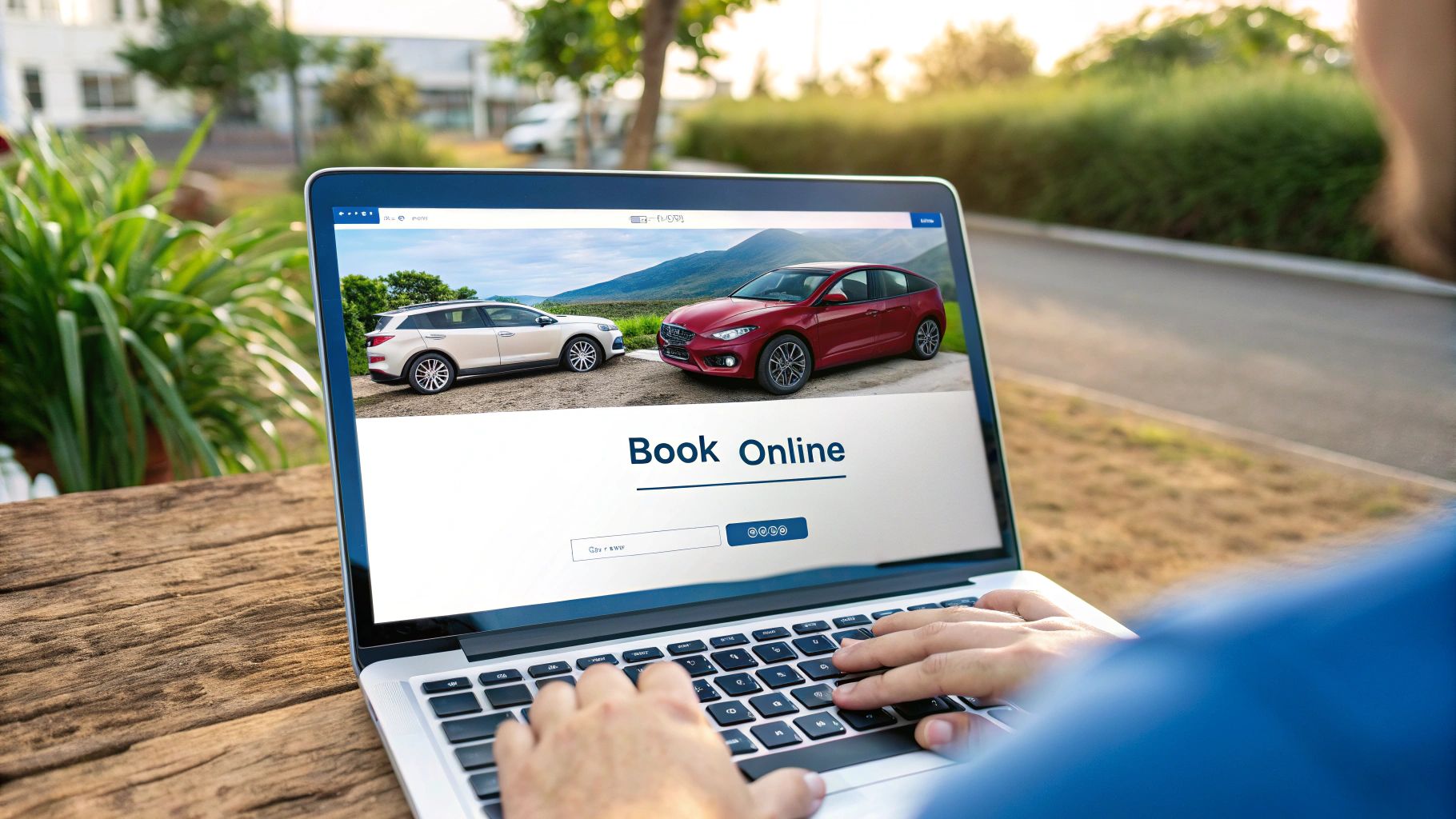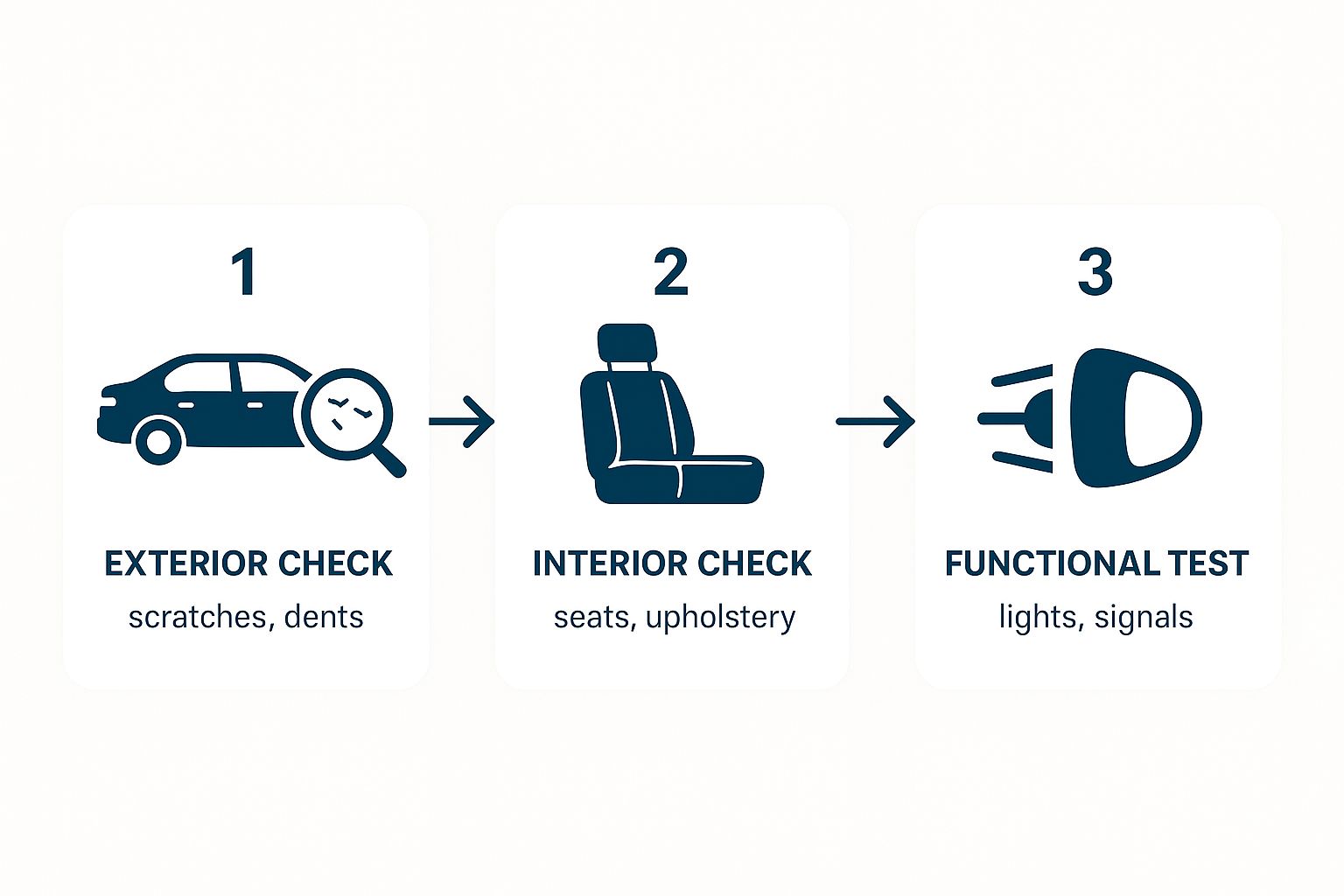How to Rent a Car: Easy Tips for a Stress-Free Experience
- fantasma70
- Jul 29, 2025
- 11 min read
Renting a car shouldn't be a headache. Let's walk through the basics you'll need to sort out before you even start searching for a car. Think of this as your pre-flight check for a smooth, hassle-free rental experience.
Your Pre-Booking Rental Car Checklist

Before you jump into comparing prices, a little prep work can save you a world of trouble later. The last thing you want is a surprise at the rental counter. It’s no wonder the global car rental market is valued at over USD 149.87 billion; savvy travelers know that booking online is the easiest way to get behind the wheel.
Getting your ducks in a row first makes the whole process, from booking to pickup, go much faster.
Must-Have Documents and Requirements
From my experience, the number one reason people get held up at the rental desk is missing paperwork. It’s a frustrating and totally avoidable delay. Before you go anywhere, make sure you have these essentials ready.
Here's a quick checklist of what you'll need to have on hand to rent a car from virtually any agency.
Car Rental Essentials Checklist
Item | Why It's Important | Pro Tip |
|---|---|---|
Valid Driver's License | This is the most crucial document. It must be current and not expired. | If your license is brand new or a temporary paper version, bring your old, expired one along too. It can help verify your identity. |
Credit Card | Agencies place a security hold on a credit card. The name on the card must match the driver's license. | Debit cards are sometimes accepted, but they often require a larger deposit and may have more restrictions. Always use a credit card if you can. |
Proof of Insurance | You need to be insured. You can buy it at the counter, but you might already be covered. | Check with your personal auto insurer and your credit card company before you book. You could save a lot by not paying for redundant coverage. |
Having these items ready will make your pickup experience a breeze.
A common pitfall I see all the time is trying to use a spouse's or friend's credit card. It won't work. The name on the credit card must perfectly match the name on the primary driver's license. No exceptions.
Understanding Car Classes
Picking the right car is about more than just finding the cheapest option. It’s about finding the right tool for the job. A solo business trip has very different needs than a family vacation to the mountains.
Rental companies sort their fleets into classes—think "Compact," "SUV," or "Luxury." A zippy compact car is perfect for navigating tight city streets and saving on gas. An SUV, on the other hand, gives you the space and comfort you need for a long-haul road trip with the whole family and all their gear.
To see exactly what these categories mean, take a look at our guide on the different [car types available for rent](https://www.cars4go.com/car-types.php). It’ll help you choose the perfect ride for your next adventure.
Finding the Best Car Rental Deals

Knowing the steps to rent a car is one thing, but actually snagging a great deal? That's a different skill entirely. It’s not just about sorting by the lowest price—it's about spotting genuine value and sidestepping those frustrating hidden fees that can blow up your budget.
A little bit of smart timing can make a huge difference in what you end up paying. If you can book your car a few weeks or even months out, especially for peak travel times like holidays or summer, you can often lock in much better rates. I’ve learned the hard way that waiting until the last minute is almost always a recipe for paying way too much.
The real secret to saving money isn't just booking early, but also being flexible. If you can shift your travel dates by even a day or two, you might find a much cheaper rate. Weekend rentals, for instance, are often priced differently than weekday rentals.
Compare Smartly, Not Just Widely
Comparison sites are great, but they can also throw a dizzying number of options at you, making it tough to figure out what you’re actually looking at. The trick is to look past that initial sticker price and compare offers on a true apples-to-apples basis.
When you're sifting through different deals, keep a close eye on these details:
Fuel Policy: Is it "full-to-full" (you bring it back full) or pre-paid? The pre-paid fuel options sold by rental companies are almost always more expensive than just filling up at a local gas station yourself.
Mileage Limits: Most rentals these days come with unlimited mileage, but you'll sometimes find budget options with a daily cap. Going over that limit can get expensive fast.
The "Or Similar" Clause: This is a big one. You're booking a car class, not a specific make and model. That "Ford Focus or similar" means you might end up with a different, but comparable, compact car.
Understanding these little details is what separates a good deal from a bad one. For a deeper look into scoring the best prices, check out our complete guide on [finding top car rental deals](https://www.cars4go.com/cars_rental_deal.php).
Even with all the online booking tools we have, it's interesting to see that traditional offline channels, like walking up to a rental counter, still make up a huge part of the market. It just goes to show how important that final, in-person interaction is, even when the initial deal was found online.
Decoding Rental Car Insurance and Add-Ons

This is the part everyone dreads. You’ve finally made it to the rental counter, and the agent launches into a pitch about insurance and other extras. It’s often the most confusing part of renting a car, and it's where a great deal can suddenly get expensive if you’re not ready.
You’ll hear a lot about two main types of coverage: the Collision Damage Waiver (CDW), which is sometimes called a Loss Damage Waiver (LDW), and Liability Insurance. Simply put, the CDW covers damage to the rental car, while liability covers damage you might cause to other people or their property.
But here’s the thing: you might not need to buy any of it. Many people walk up to that counter already covered and don't even realize it.
Check Your Existing Coverage First
Before you even leave for your trip, I always recommend making two quick calls. First, ring up your personal auto insurance agent. Then, call the number on the back of your credit card.
Ask them both a very specific question: "What coverage, if any, do you provide for rental cars?" You'll often find your personal policy extends to rentals, and many travel credit cards include secondary CDW coverage as a fantastic perk. This simple bit of homework can easily save you $20 to $40 per day.
For example, if you find out your personal auto policy covers liability and your credit card covers collision, you can confidently decline the pricey waivers at the counter. I always make a note of who I spoke with and when, just in case.
Knowing your coverage before you arrive is your best defense against a high-pressure upsell. When the agent starts their pitch, you can simply and confidently say, "Thanks, but I'm already covered." It stops the conversation cold and prevents you from paying for protection you don't need.
Are the Add-Ons Worth It?
After the insurance discussion, get ready for the extras. They'll offer you GPS units, toll passes, child seats, and more. It’s smart to think about what you actually need versus what’s just an overpriced convenience.
That pre-paid toll pass, for instance, might sound tempting. But it almost always includes a daily service fee that makes it far more expensive than just paying tolls as you go.
Here's how I break down the most common add-ons:
GPS/Sat Nav: Just use your phone. An app like Google Maps or Waze is free, more familiar, and usually more up-to-date than the car's built-in system.
Child Seats: This is a non-negotiable safety essential if you have kids. However, rental companies charge about $10-$15 per day for one. If you can, bring your own from home to save a good chunk of change.
Pre-Paid Fuel: This is almost never a good deal. They charge a premium for the "convenience" of returning the car without a full tank. It's always cheaper to find a gas station near the airport and fill it up yourself before you drop it off.
Thinking through these options ahead of time keeps you in control and ensures your final bill doesn’t come with any nasty surprises.
What to Expect at the Rental Counter
You've made it. Arriving at the rental counter is that last little hurdle before your adventure really begins. A few minutes of preparation here can make the difference between a smooth, quick handoff and a frustrating delay.
Make sure you have everything easily accessible: your valid driver's license, the same credit card you used to book, and your reservation confirmation. Having these in hand when you walk up to the agent shows you're ready and helps speed things along.
You'll almost certainly be offered an upgrade or extra insurance. It's just part of the process. If you've already sorted out your insurance needs beforehand, you can confidently and politely say no. A simple, "No thank you, I'm all set," usually does the trick without creating any awkwardness.
Before you even think about pulling out of the parking spot, the most important step happens right after they hand you the keys. A thorough vehicle inspection is your number one defense against being on the hook for damage you didn't cause. Don't let excitement make you rush this.
Your Pre-Departure Vehicle Inspection
Seriously, take five to ten minutes for a proper walk-around. Whip out your phone and take a slow, clear video of the entire car. Get up close on the bumpers, doors, and wheels—these are common spots for dings and scratches. The video gives you a timestamped record of the car's condition the moment you got it.
This simple guide breaks down exactly what to look for.

Following a system like this ensures you don't miss anything important, from the outside of the car to the inside functions.
Once you’ve checked the exterior, hop inside. Look for any issues with the interior—stains on the seats, tears in the fabric, or small cracks in the windshield that can easily be missed. Finally, do a quick function check. Turn on the lights, test the signals, give the horn a quick toot, and check the A/C.
If you spot anything, no matter how minor, walk right back to the agent. Point it out and insist they document it on your rental agreement before you leave. This little bit of diligence is what separates a savvy renter from someone who might face an unexpected bill later. For more location-specific advice, feel free to check out any of our [Cars4Go rental locations](https://www.cars4go.com/car_rental_locations.php) and chat with our staff.
Driving and Returning Your Rental Car
Alright, you've got the keys, your stuff is in the back, and you're ready to hit the road. This last part of the rental experience is all about having a great drive and an easy, no-fuss return.
Your main concern on the road, besides following the GPS, should be the fuel policy.
Most rentals, and this is standard practice at Cars4Go, run on a “full-to-full” policy. From my experience, this is hands-down the cheapest way to go. Just find a gas station near the airport before you head back and top off the tank. The other option you might see is pre-paid fuel. It's convenient, sure, but you'll pay a premium for gas you might not even use. Stick with full-to-full.
What to Do If Something Goes Wrong
Even with a perfectly maintained car, life happens. If you run into any mechanical trouble, the first thing to do is pull over somewhere safe. Then, grab your rental agreement and call the 24/7 roadside assistance number listed. Whatever you do, don't try to be a hero and fix it yourself or take it to a random mechanic. That’s a fast way to void your rental agreement.
In the unlucky event of an accident, here’s what you need to do:
Safety First: Check on everyone involved and get to a safe spot away from traffic if you can.
Get Help: If there are any injuries, call local emergency services right away.
Report Everything: You must call both the police and the rental agency immediately. Getting a police report is non-negotiable; skipping this step can cause huge insurance headaches down the line.
The Grand Finale: Returning the Car
Getting your rental back on time is a big deal. Most companies give you a small grace period, maybe 29 minutes, but go past that and you could be on the hook for a whole extra day at a painfully high, non-discounted rate.
When you pull into the return lane, an agent will give the car a final look-over. This is where that walk-around video you took at the beginning becomes your best friend. It’s your proof against any arguments about pre-existing scratches or dings.
Once they've checked the car and you've returned the keys, don't just walk away. Always ask for a final, closed-out receipt. This little piece of paper is your proof that the rental is over and you owe nothing more. It’s the best way to prevent any mystery charges from popping up on your credit card weeks later.
Knowing these steps is more important than ever, especially as leisure travel continues to power the rental industry. In places like the United States, strong vacation spending is what drives the market. You can explore more on the global car rental market if you're curious about the bigger picture.
Have a Few More Questions? Let’s Clear Them Up
Even the most seasoned travelers have questions pop up when it's time to rent a car. It's completely normal. Let's walk through some of the most common ones we get, so you can feel totally prepared for your trip.
Can I Rent a Car if I'm Under 25?
You absolutely can, but there's an important detail to know. Most rental companies, including Cars4Go, are happy to rent to drivers between 21 and 24 years old. The trade-off is that you'll almost always have to pay a daily “Young Renter Fee.”
This fee isn't set in stone; it can change quite a bit depending on where you're renting and the company's specific policy. Young renters might also find they can't book certain cars, like high-end luxury models or bigger SUVs. The best move? Call the rental branch directly before you finalize anything to get the exact details on fees and restrictions.
What Happens if I Bring the Car Back Late?
When it comes to rental returns, timing is everything. Most agencies give you a small window of flexibility—usually a 29-minute grace period. Once you go past that, you're likely looking at a charge for a whole extra day, often at a steep standard rate, not the nice discounted price you originally booked.
Pro Tip: If you know you're running late, call the rental location right away. A simple heads-up can go a long way. They appreciate the communication and might be able to help you avoid that extra day's fee.
Can I Pay with a Debit Card Instead of a Credit Card?
While it’s sometimes possible, using a debit card for a rental car can be a bit more complicated. It’s not as straightforward as using a credit card.
If a location does accept debit cards, you should expect a few extra hurdles. This could mean:
A much larger security deposit held from your bank account.
Needing to show proof of a round-trip flight.
Even undergoing a quick credit check at the counter.
Because these rules vary so much from one office to another, you must call the specific location ahead of time. Confirming their debit card policy and what you need to bring will save you from a major headache at the pickup counter.
Feeling ready to get on the road? At Cars4Go, we focus on making the rental process as simple and clear as possible. You'll find no hidden fees and all the options you need for a fantastic trip.
Find your perfect ride and book your car with Cars4Go today.



Comments